Schools closing ‘could be behind drop in Covid-19 cases across UK’
Schools in Scotland shut at the end of June, while those in England closed in July.

Schools closing for the summer break is likely to be one of the reasons why coronavirus cases are falling across the UK, a leading expert has said.
Dr Mike Tildesley, a member of the Scientific Pandemic Influenza Modelling group (Spi-M) advising ministers, said he is “cautiously optimistic” about dropping cases but only time will tell if the third Covid wave is “turning round”.
The expert in infectious diseases, from the University of Warwick, told BBC Radio 4’s Today programme that “any situation where cases are falling clearly is good news”.
But he added: “I think what we need to think about, though, is that there has been a change recently and I think the big one is that, in a lot of parts of the country, schools have now closed for the summer.
“Now, of course, because of that, what that means is… secondary school children have been doing lateral flow tests twice a week for quite a long period of time and we know at the moment cases are slightly higher in younger people, (and) because schools have now broken up, it may be that part of the reason cases have dropped somewhat is that we’re not detecting as many cases in younger people now.
“The other thing we do need to look at before we really draw confidence in whether we are seeing everything turning round is what’s happening with hospital admissions and, of course, what’s happening with deaths.”
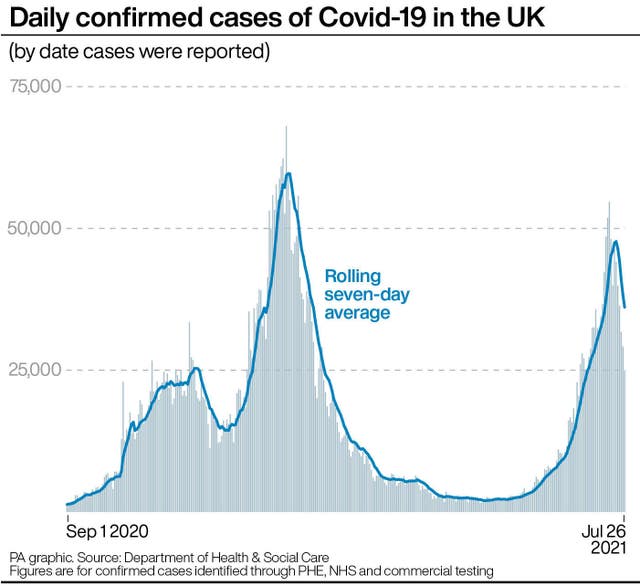
Dr Tildesley said it always takes a couple of weeks for case numbers in the community to be reflected in hospital admissions.
The time lag between infections and hospital admissions means that admissions are likely to continue to rise in the coming days regardless of the number of cases.
He said: “I would say that the fact the cases have gone down for the last five days or so is… I’m cautiously optimistic about that, but I think we’re going to have to wait another couple of weeks before we see, firstly, the effect of the 19th of July relaxation and, second, whether hospital admissions will start to go down.
“I think if they do then at that point we can be much more confident that we’re starting to see, hopefully, this wave turning round.”
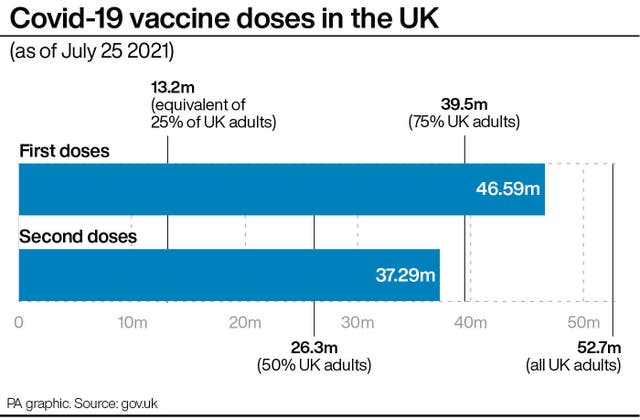
Regarding the amount of lateral flow testing that was going on in secondary schools, Dr Tildesley said: “Testing clearly is very important, but it is true of course that when you test more you find more, and of course this is the issue that, when you’re doing a lot more lateral flow testing, you’re going to find more positive cases.
“So, when that stops, it’s possible that cases may seem to go down, when infections may be not going down as fast.”
He added: “We need to monitor this over the next few days to see if this is consistently going down or whether we are sort of seeing a dip because schools are closed and then maybe things might level off again, so I think it remains to be seen exactly what’s going to happen.”
UK figures show that the number of new cases of Covid-19 reported each day in the UK have fallen for the fifth day in a row.
A total of 29,173 cases were reported by the Government on Sunday, down from the 48,161 recorded a week ago on July 18.
The last time cases fell for five consecutive days was between February 5 and 9, and average daily cases are down 15% week on week.
However, it is too soon for the data to show any impact from the ending of legal restrictions in England on July 19 due to the time lag between people becoming infected and getting tested.
Paul Hunter, professor of medicine at the University of East Anglia, said over the weekend that the impact of the July 19 easing may not be sufficient to start case numbers increasing again, but added that he could not be certain.
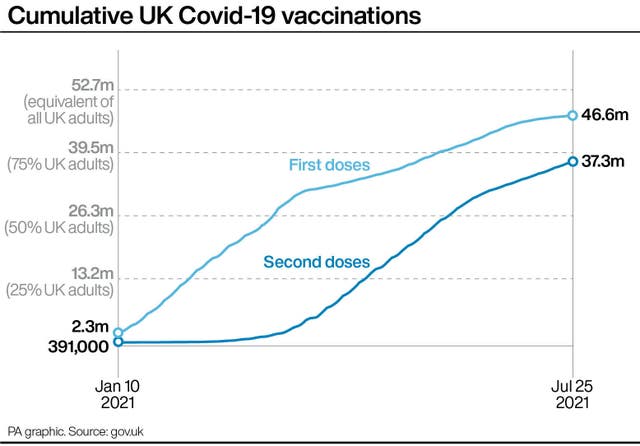
Office for National Statistics (ONS) figures released on Friday, which are based on large numbers of people being tested for Covid whether they have symptoms or not, also showed that infections were rising across the UK.
Education minister Vicky Ford said on Monday that, while the sustained drop in coronavirus cases is “very good news”, people must not become complacent.
“We all know how quickly it can go back up again,” she told Sky News.
A Number 10 spokesman said the fall in coronavirus cases was “encouraging” but numbers were still expected to rise.
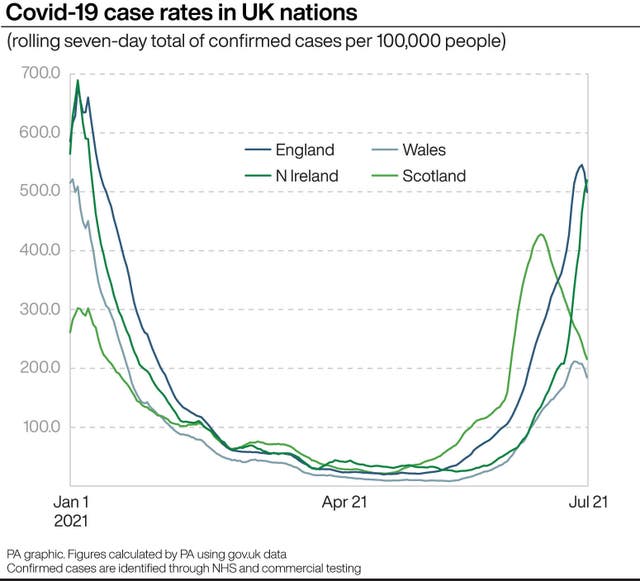
He said: “Throughout the pandemic we have always said it’s encouraging when cases are falling.”
But he also said the pandemic “is not over”, and “we should still expect to see a rise in case numbers given the move to Step 4 last week”.
The spokesman added: “The Prime Minister thinks we’re not out of the woods yet.”
Dr Stephen Griffin, associate professor in the School of Medicine, University of Leeds, said: “It will be important to see whether the results of the ONS survey this week are in agreement with a fall in prevalence.
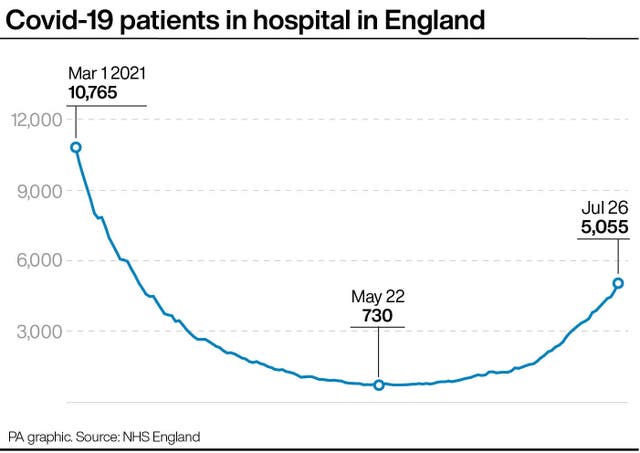
“Whilst this (the drop in cases) appears to be good news, I would be surprised if we are likely to see a continuation of this decline and there are many factors that one can speculate – and at present we can only speculate – might have contributed to this.”
He said ongoing coverage of the “pingdemic” means that a great many people have been asked to self-isolate recently “and this could have a direct impact upon transmission”.
He added: “Similarly, the large number of school bubbles that have been closing may also have reduced transmission, plus we are now in the holiday period, further reducing contacts.
“One troubling concern is that people might actively avoid being put forward for testing as a result of messaging that minimises the dangers of infection, or that vaccinated individuals with mild symptoms might not realise they are infected; whilst the latter are likely to represent a relatively small proportion of cases, this could still result in transmission given current absence of restrictions.”
It came as senior ministers are set to discuss extending the rollout of daily testing sites to ease the concerns of industry and frontline services by allowing further exemptions from isolation for critical workers.
The Covid operations sub-committee of Cabinet will meet on Monday to discuss whether to widen the number of jobs eligible for the testing regime, or whether to boost the numbers for existing sectors in order to tackle the “pingdemic”.





